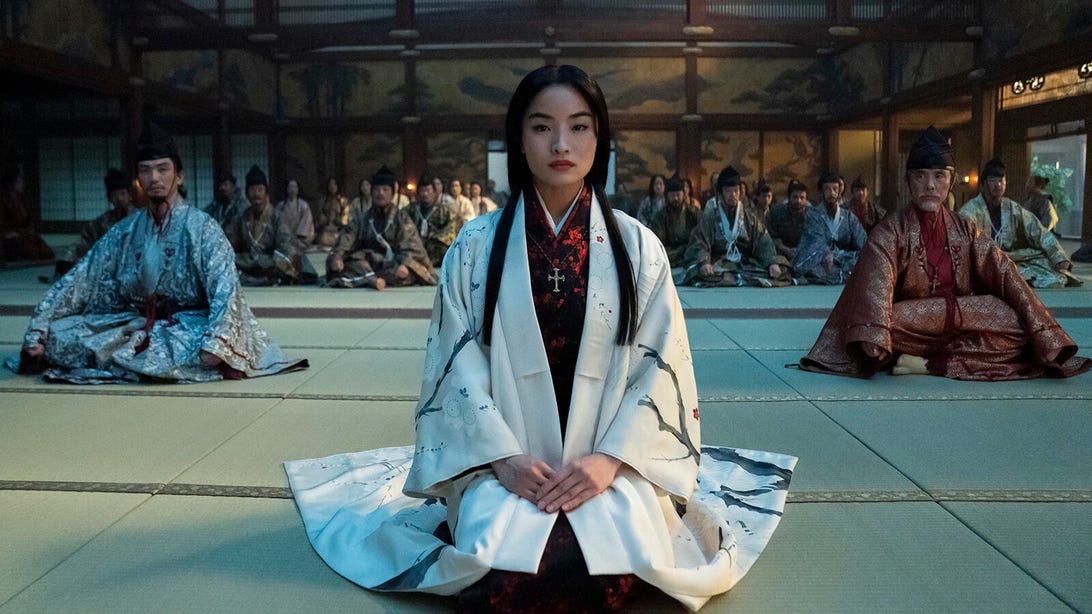‘It was like Mariko was a part of me’
Anna Sawai was looking for a challenge. It was 2021, and she had wrapped filming for Apple TV+’s Pachinko. “I told my agent that I wanted to do something that scares me,” Sawai recalled to TV Guide. And though she did not know it initially, her wish came true when she landed the role of Toda Mariko in FX’s Shōgun. “I was like, ‘Oh my God, I’m so tired and I don’t know who I am anymore,'” Sawai remembered telling her agent after she began shooting for the historical drama. “They were like, ‘But you said you wanted something that scares you?'” Sawai said. The actor remembers thinking, “You’re absolutely right.”
Since the 31-year-old actor, originally from New Zealand, portrayed Elle in F9, Sawai has starred in shows including Pachinko and Apple TV+’s Godzilla spin-off Monarch: Legacy of Monsters. But Shōgun marks the longest period of time she has spent with a character. For 10 months, Sawai inhabited Mariko, an aristocratic woman from a disgraced family who is assigned to be an interpreter by her lord Yoshii Toranaga (Hiroyuki Sanada). She is to translate for him and “barbarian” English sailor John Blackthorne (Cosmo Jarvis), who landed in the shores of Japan after being shipwrecked.
Like most characters in Rachel Kondo and Justin Marks’ Shōgun, which adapts James Clavell’s 1975 best-selling novel of the same name, Mariko is inspired by a real-life figure. “Knowing that Mariko is based on Hosokawa Garasha, who existed in Japan in 1600, that itself was so powerful,” Sawai said. We were sitting across a small table at The Langham Huntington in Pasadena, California, a few weeks before Shōgun’s launch. Sawai, who resides in Japan, was visiting California to attend a series of premiere-related events, including the Television Critics Association winter press tour. The actor thought back on the experience of playing Mariko. “In the beginning, it was a little bit more calculated — everything that I was doing was planned,” Sawai said. “Then towards the end of the shoot, it just came naturally.”
Over time, it became more difficult for the actor to separate herself from the character — she even started to adopt Mariko’s language. Sawai gave an example: In Japan today, the Japanese word commonly used to refer to the country is “Nihon.” The actor, who is fluent in Japanese and English, accidentally used the word “Hinomoto” instead when talking to her castmates. “That’s the way we say it in the piece,” Sawai said of the older term. “Things like that, it was like Mariko was a part of me.”

Sawai’s start in acting was heavily motivated by a particular musical dream. “When I was young, I wanted to be Britney Spears,” she laughed. After living in different parts of Asia, her family moved to Japan when she was 10. That year, Sawai auditioned for a role in the musical Annie. “I wasn’t prepared for anything, and so I didn’t make it through the first stage,” she recalled. Up until then, she had mostly taken lessons in dance — ballet, specifically — and not singing. “I was so, so bummed.”
But the rejection became her North Star. For the next year, Sawai trained daily after school for the musical. “I’m not even kidding, like 356 days,” she emphasizes. And when it was time for auditions again, 11-year-old Sawai landed the titular role. “My mom kept telling me, if you want to do things that people aren’t doing, then while they’re playing you have to work on it,” Sawai said “I still live by that.”
In the years after, she continued to pursue her dreams of becoming a singer. Sawai joined the Japanese agency Avex and took lessons with the goal of debuting as a musical artist. But one experience shifted her aspirations. In 2009, Sawai starred in the martial arts film Ninja Assassin. “That’s when I found out that I wanted to act more than I wanted to be Britney Spears,” she said. Sawai had this vocational direction in mind when she debuted as a member of Avex’s girl group FAKY in 2013. “When I joined the agency, I wanted to sing more — but I joined the agency when I was 13, so it was very early. And at 16 I already knew that I wanted to act,” she shared. Her team at the time encouraged her to continue with the group. “They told me that if you’re well-known as a singer, then it’s going to help you in acting.”
In 2018, Sawai departed from FAKY to focus on her main career goal. “After countless discussions, we have agreed to support [Anna’s] decision to pursue her dream as an actress,” the group said at the time. Sawai wrote on Instagram, “I apologize for the sudden announcement.”
“There was a part of me that was worried when I quit the girl group,” Sawai recalled. But another part of her believed that her dream to become an actor could actually happen. That part was right. In 2019, Sawai landed the role of Elle in the Fast & Furious franchise sequel F9. “It’s funny because one of my friends had told me, years back before any of this happened, ‘You seem like you could be in Fast & Furious,” she says. “So when it happened, it was just a surreal feeling.” And while Sawai grew up in Japan, her eyes were set on the U.S. when it came to acting. “I grew up watching Hollywood films. And so when I thought, ‘Oh, I want to act,’ it was never, ‘I want to act in Japan,'” she said. “It was always, ‘I want to act in things that I’ve been watching.'” She has always been more drawn to the art itself than to Hollywood as a destination, but starring in films and series produced in the West has also been significant given that diversity and inclusion in media is dear to Sawai’s heart.

“Because I am Japanese, I’ve always wanted more accurate Japanese representation,” the actor said. “And lack of representation has been kind of answered now — we have more.” But to Sawai, misrepresentation is still present. “And so with Shōgun, I’m happy to say this is something that I don’t have to make any excuses for.”
At Shōgun‘s New York press screening in December, actor Hiroyuki Sanada — who is also credited as producer — spoke about how the creative team strove for authenticity. “We hire[d] the Japanese crew, who ha[ve] a long experience for the samurai drama,” Sanada said. “Wig, costume, props, everything. And then, most importantly, master[y] of gesture, called ‘shosa’ — how to walk, how to sit, how to kill.”
These are all elements that Sawai studied and practiced in order to portray Mariko. “I had to relearn everything,” she said. This level of attention to detail is part of why the actor believes in Shōgun. “I can tell my Japanese friends, ‘You should watch it and you’ll be proud of it,'” she said. And having the opportunity to portray a character based on a woman as historically significant as Hosokawa Garasha only enriched Sawai’s experience. “Her journey is not something that you see often,” the actor said.
More than a year after filming wrapped, Sawai remembers one co-star from set particularly fondly. “I made a great connection with the horse I’m riding in Shōgun,” she said, before exclaiming in a higher octave, “Ugh, my God, I’m so in love with him!” The horse’s name is Deuce, and Sawai still looks at his photo every day.
Even this affinity brought her closer to the real-life woman who inspired her character. “As I was shooting, I was reading books [about] Hosokawa Garasha, and it said that she loved horses — it was their eyes that she fell in love with,” Sawai said. “And I have so many pictures of Deuce’s eyes in my phone.”





